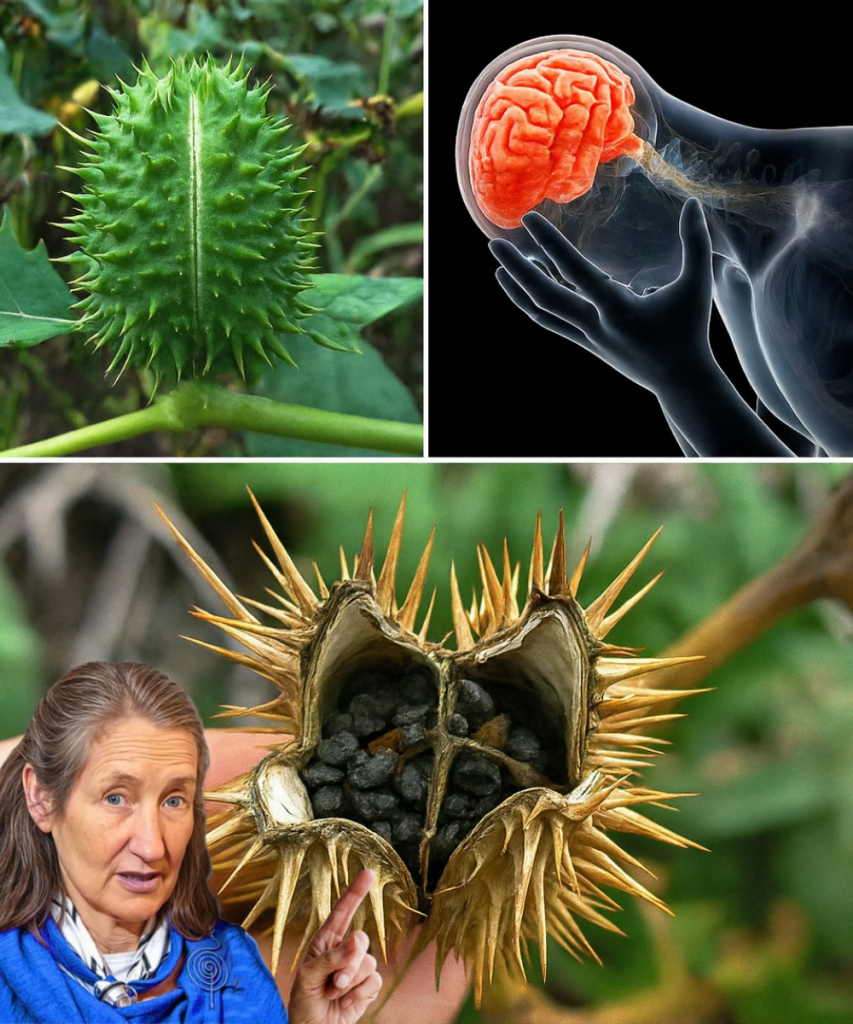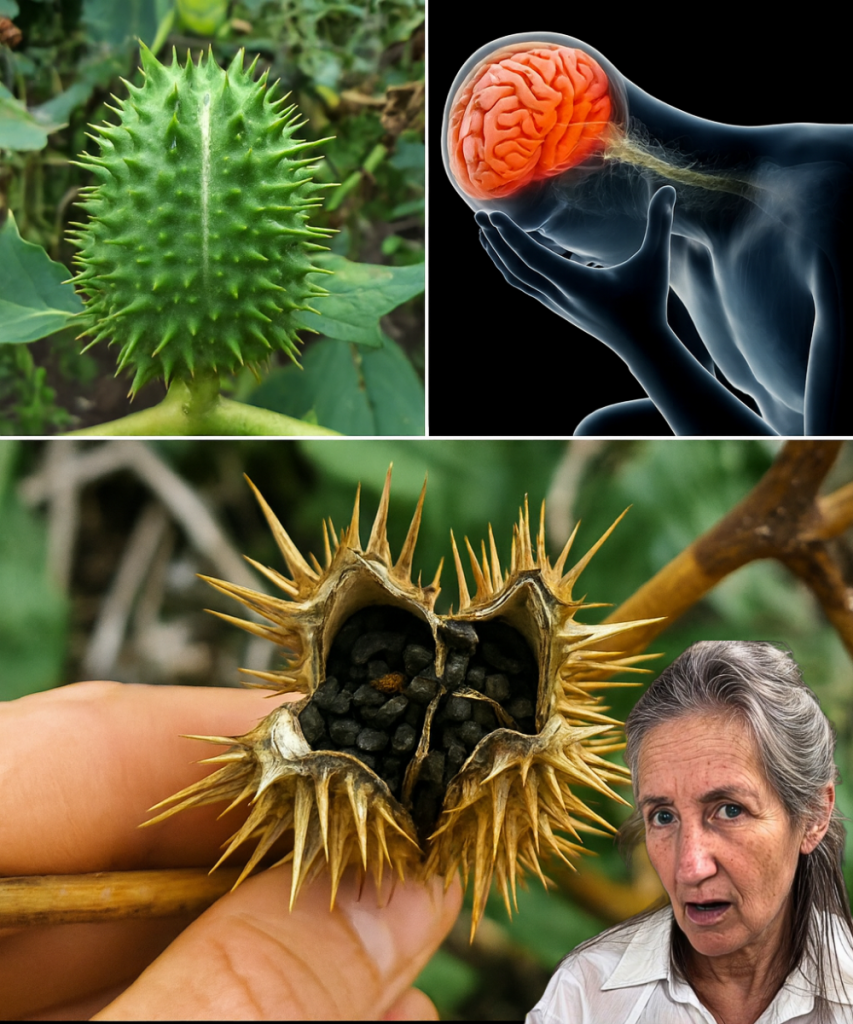What if a plant with beautiful, trumpet-shaped flowers and intriguing seed pods was secretly a silent threat, capable of causing hallucinations, seizures, or even death? Meet Datura stramonium, commonly known as Jimson weed, thorn apple, or devil’s trumpet—a plant as alluring as it is deadly. Found across the globe, from North America to tropical regions, this deceptively attractive herb has been used in traditional medicine and rituals for centuries, but its potent toxins make it a serious health hazard. Curious about the risks of this notorious plant and how to protect yourself and your loved ones? Dive into this guide to uncover the dangers of Datura stramonium and why awareness is your best defense.

🌿 Why Datura Stramonium is a Dangerous Beauty
At first glance, Datura stramonium captivates with its white or purple trumpet-shaped flowers and spiky seed pods, but beneath its beauty lies a toxic arsenal. The plant contains powerful alkaloids—atropine, hyoscyamine, and scopolamine—that act as anticholinergics, disrupting the nervous system by blocking acetylcholine. This interference can wreak havoc on your body, affecting everything from your heart to your brain. Every part of the plant—leaves, flowers, seeds, and stems—is poisonous, and even small amounts can lead to severe consequences.
What makes Datura so dangerous? Its unpredictable potency and widespread presence in gardens, roadsides, and wild areas make accidental exposure a real risk, especially for children and pets. Whether ingested accidentally or misused recreationally, the plant’s effects can be life-threatening. Let’s explore the health risks and symptoms to watch for to keep you and your family safe.
💉 The Toxic Trio: Datura’s Dangerous Alkaloids
Datura stramonium’s toxicity stems from three potent alkaloids, each with its own devastating effects:
- Atropine: Causes pupil dilation, rapid heartbeat, and vivid hallucinations, disrupting normal bodily functions.
- Hyoscyamine: Reduces bodily secretions like saliva and sweat, leading to dry mouth, difficulty urinating, and digestive issues.
- Scopolamine: Triggers intense hallucinations, confusion, and agitation, often leaving users disoriented and unable to distinguish reality.
These compounds make Datura one of nature’s most hazardous plants, with effects that can linger for days and, in severe cases, prove fatal. A 2019 study in Clinical Toxicology reported that even small doses can cause significant anticholinergic poisoning, underscoring the need for caution.
🚑 Symptoms of Datura Stramonium Poisoning
Datura poisoning is a medical emergency, with symptoms appearing within 30–60 minutes of ingestion and lasting up to 48 hours. The effects, known as anticholinergic toxicity, can be both alarming and dangerous. Here’s what to watch for:
- Dry Mouth and Skin: A hallmark sign, as the plant suppresses saliva and sweat production.
- Dilated Pupils: Blurred vision and light sensitivity due to extreme pupil dilation.
- Rapid Heartbeat (Tachycardia): A dangerously fast pulse that can strain the heart.
- Delirium and Hallucinations: Vivid, often terrifying hallucinations that disconnect users from reality, potentially leading to paranoia or violent behavior.
- Confusion and Disorientation: Difficulty thinking clearly or making decisions, often accompanied by memory lapses.
- Agitation and Restlessness: Erratic behavior and inability to stay calm.
- Seizures: In severe cases, convulsions can occur, requiring immediate medical attention.
- Coma or Death: High doses can lead to unconsciousness or fatal respiratory or cardiac failure.
Long-term effects may include persistent confusion, memory issues, or psychological disturbances like anxiety, especially after severe poisoning. A 2020 case study in Journal of Medical Toxicology noted that survivors of Datura poisoning sometimes experience lingering cognitive effects, highlighting the plant’s lasting impact.
🧒 Risks to Children and Pets
Datura’s alluring appearance poses a significant risk to curious children and pets. Its flowers and seed pods can tempt young explorers or animals, leading to accidental ingestion. Children are particularly vulnerable due to their smaller body size, where even a tiny amount can trigger severe symptoms. Pets like dogs and cats may chew on leaves or seeds, exhibiting signs like vomiting, drooling, uncoordinated movements, or hallucinations. A 2021 report in Veterinary Toxicology documented cases of pet poisoning from Datura, emphasizing the need to remove this plant from areas accessible to animals.
🎭 The Perils of Recreational Use
Some individuals seek out Datura stramonium for its hallucinogenic effects, unaware of its extreme dangers. The scopolamine-induced hallucinations are often intense and disorienting, leading to unpredictable behavior or self-harm. Unlike other psychedelics, Datura’s effects are nearly impossible to control due to varying alkaloid concentrations, which depend on the plant’s age, growing conditions, and part consumed. A 2018 study in Psychopharmacology warned that recreational use frequently results in emergency room visits due to delirium and cardiovascular complications. The risk of overdose is high, as there’s no safe way to gauge a non-toxic dose.
🩺 Treatment for Datura Poisoning
Datura stramonium poisoning is a medical emergency requiring immediate action. If you suspect exposure, call emergency services or a poison control center right away. Treatment typically includes:
- Activated Charcoal: Administered early to absorb toxins in the stomach.
- Supportive Care: IV fluids, heart monitoring, and sedatives to manage symptoms like agitation or rapid heartbeat.
- Physostigmine: In severe cases, this antidote reverses anticholinergic effects, but it must be given by a medical professional.
Prompt intervention is critical, as delays can lead to life-threatening complications. A 2022 review in Critical Care Medicine emphasized that early treatment significantly improves outcomes in Datura poisoning cases.

💡 How to Protect Yourself and Others
Preventing Datura exposure starts with awareness and caution:
- Identify the Plant: Learn to recognize Datura stramonium’s trumpet-shaped flowers, spiky seed pods, and jagged leaves. It often grows in disturbed soils, like roadsides or gardens.
- Remove from Your Environment: If found in your yard, wear gloves and remove the plant carefully, disposing of it securely to prevent regrowth.
- Educate Children: Teach kids to avoid touching or tasting unknown plants, emphasizing Datura’s dangers.
- Protect Pets: Keep animals away from areas where Datura grows, and monitor for signs of poisoning.
- Avoid Recreational Use: Steer clear of Datura for its hallucinogenic effects, as the risks far outweigh any temporary high.
🌈 Why Awareness Matters
Datura stramonium’s beauty masks a deadly threat, making education crucial for safety. Its potent alkaloids can cause severe physical and psychological harm, particularly in children, pets, or those seeking recreational highs. By understanding its risks and symptoms, you can protect yourself and your loved ones from accidental poisoning. This plant serves as a reminder that nature’s wonders often come with hidden dangers, and knowledge is your best defense.
💪 Stay Safe and Informed
Don’t let Datura stramonium’s allure fool you—this plant is a serious health hazard that demands respect. From its toxic alkaloids to its unpredictable effects, it poses risks that can’t be ignored. Stay vigilant, remove it from your surroundings, and educate others about its dangers. If you suspect exposure, seek emergency medical help immediately. By staying informed, you can enjoy nature’s beauty safely and keep your loved ones protected from the hidden perils of this devil’s trumpet.









